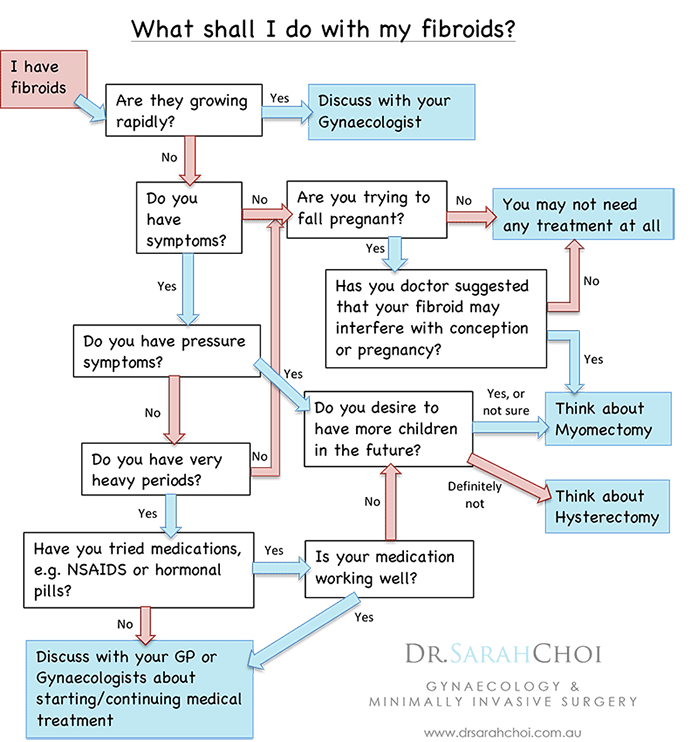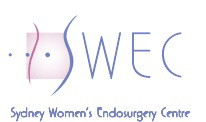Request an Appointment - Call us today: 1300 885 803

FIBROID
What are fibroids?
Fibroids are non-cancerous (benign) growth from the muscle layer of the uterus. They are also called leiomyomas or myomas. Fibroids can bulge from the inside or outside of the uterus.
Fibroids are very common. Approximately 4 in 5 women have had fibroids in their lifetime, although not all of these women have symptoms or even know about the presence of fibroids.
Are fibroids cancer?
Fibroids are not cancer and are not thought to be able to change to cancer. In fact, cancer of the uterine muscle wall (leiomyosarcoma) is a rare disease – it happens in only around 0.1 – 0.3% of uterine growth. The benign fibroid is unlikely to turn into cancer. One of the warning signs for cancer is a rapidly growing uterine mass, especially in menopausal women. However, studies showed that even among patients undergone surgery for “rapidly growing” uterine growths, over 99% have benign fibroids and only less than 1% have confirmed cancer on pathology. Leiomyosarcoma is one of the rarest forms of gynaecological cancer. You should have a in-depth discussion with your gynaecologist if you have any concerns about a rapidly growing fibroid.
What are the causes of fibroids?
The cause of fibroids is unknown. There are a number of theories, but none of them gives a complete explanation. The growth of fibroids is likely to be related to multiple factors, e.g. genetic predisposition, lifestyle and reproductive factors. Fibroids also seem to respond to female hormones estrogen and progesterone. Some fibroids grow with time and others shrink. In general, fibroids tend to grow bigger when women are pregnant, and shrink in size after menopause.
What are the symptoms?
Fibroids can range in size from less than one centimeter to the size of a melon or even larger. Most of the fibroids are small and do not cause any symptoms at all. Many women do not know that they have fibroids until they have an ultrasound scan or surgery.
Fibroids are more likely to cause symptoms if:
- there are many fibroids;
- the fibroids are large; or
- the fibroid bulges into the cavity of the uterus.
How is fibroid diagnosed?
A doctor may suspect fibroids if your uterus is enlarged or has an irregular shape. The most common way to diagnose fibroid is by a pelvic ultrasound scan.
What are the treatment options?
For many women, fibroids do not cause symptoms and do not interfere with pregnancy. No treatment is required for these cases.
Treatment is warranted when the fibroids are causing symptoms. The choice of treatment is highly individualized and should be tailored according to the type and severity of symptoms, age, fertility wish, size and location of the fibroids, general health and previous medical history of the woman. The treatment options can be medical or surgical.
There are no medications that can eliminate or get rid of the fibroids. Medical treatments aim at relieving the symptoms. For example:
- If you have heavy periods, your doctor may suggest the use of NSAIDS (Non-steroidal anti-inflammatory drugs, such as mefenamic acid) or tranexamic acid to help reduce the bleeding. Iron supplement may be recommended if you have anaemia.
- Most forms of oral birth control pills or skin patches can reduce bleeding and menstrual cramp. Use of hormonal is suitable for women who are not trying to fall pregnant.
- Gonadotrophin-releasing hormone (GnRH) agonists are medicine given in form of injection or nasal spray. They work by “turning off” the ovaries and cause a state of reversible menopause, and therefore, the fibroids shrink. However, it is not recommended as a long-term treatment for fibroids because of its risk of thinning bones and osteoporosis. Once the treatment stops, the fibroids are likely to grow again.
Surgical treatment of fibroid
Surgery is the only effective way to completely remove the fibroids. You may consider a surgical treatment for fibroids if:
- You have fibroid-related heavy menstrual bleeding that does not get better with medical treatments; or the bleeding is so heavy that it causes anaemia. These happen more often when the fibroids bulge into the cavity of the uterus, when the fibroids are large, or when there are multiple fibroids.
- You have pressure symptoms that are caused by a large fibroid. You may feel a sense of pelvic pressure or fullness in the abdomen. If a fibroid is pressing on the bladder, the woman may feel like she need to pass urine very frequently.
- You are facing difficulty in falling pregnant and your fertility specialist advised that the fibroids appear to be interfering.
Myomectomy - Myomectomy is a surgical procedure to remove the fibroids, without removing the uterus. This is offered to women who have not yet completed their families and would like to preserve the uterus for future pregnancies. There are different ways of myomectomy:
- Hysteroscopic resection of fibroid (hysteroscopic myomectomy)
- Open abdominal myomectomy
- Laparoscopic (keyhole) myomectomy
Hysterectomy - Hysterectomy is surgical removal of the uterus. It is often the preferred surgical treatment for women who no longer desire to have more children. Hysterectomy offers a definitive cure of heavy period and fibroid-related pressure symptoms. Clinical studies have shown that women who have bothersome fibroids enjoy better quality of life and better sex life after a hysterectomy.
Similarly to myomectomy, hysterectomy can be performed in different ways –
- open abdominal hysterectomy
- vaginal hysterectomy
- laparoscopic (keyhole) hysterectomy
Alternative treatments include Uterine Artery Embolization and Magnetic Resonance Guided Focused Ultrasound. These procedures are performed by interventional radiologists in selected centres only and therefore not universally available. It takes several months for the fibroids to shrink following the procedure, and it may take even longer for the fibroid-related symptoms to disappear. During this period, patients commonly experience pain, lower-grade fever and persistent vaginal discharge. If complications like infection or severe pain occur, a hysterectomy may be necessary. Pregnancy is not usually recommended after these treatments.

Procedures
- Laparoscopy (keyhole surgery
- Hysterectomy (removal of uterus)
- Myomectomy (removal of fibroids)
- Treatment of endometriosis
- Cystectomy (removal of cyst on ovaries)
- Hysteroscopy
- Hysteroscopic polypectomy (removal of polyp in uterus)
- Surgical removal of pelvic masses
- Diagnosis and treatment of pelvic pain
- Pelvic floor surgery - repair of prolapse
and incontinence surgery - Fertility surgery and tubal patency check
- Ectopic pregnancy
- Treatment of abnormal vaginal bleeding or heavy period
Services
- Fibroid of uterus
- Heavy periods and menstrual pain
- Abnormal vaginal bleeding, e.g. irregular periods, bleeding
after menopause - Endometriosis
- Polyps of Uterus
- Cyst of ovaries
- Pelvic masses
- Chronic pelvic pain
- Pelvic Adhesions
- Pelvic floor disorders – vaginal prolapse and urine leakage (incontinence)
- Fertility issues
- Ectopic pregnancy and early pregnancy problems
Contact us:
The SAGE Centre
656 Pacific Highway
Chatswood NSW 2067
Phone:
Fax:
Email:
1300 885 803
02 9475 0028
Dr. Sarah Choi











